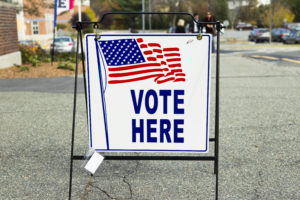
President Trump signs an executive order in an attempt to weaken social media companies, the State Department declares Hong Kong is no longer autonomous, and more…
IN THE NEWS
- President Trump signed an executive order declaring his “commitment to free and open debate on the internet” and calling for the National Telecommunications and Information Administration to petition the Federal Communications Commission for a proposed rulemaking that could potentially limit certain legal protections enjoyed by social media companies under Section 230 of the Communications Decency Act. The executive order appears to have come in response to Twitter’s recent efforts to prevent the spread of misinformation by adding a label to tweets by world leaders that may include misleading information. President Trump received such a label on Tuesday, in a tweet claiming that mail-in ballots would be substantially fraudulent. Academics, internet civil liberties organizations, and other commentators have questioned the order or any subsequent rulemaking’s lawfulness under the First Amendment. Spokespersons from Google and Facebook have stated that the current Section 230 promotes the free exchange of information online and gives companies wide discretion in regulating the content on their platforms.
- In an official certification to Congress, the U.S. Department of State declared that Hong Kong is no longer regarded as autonomous from China. Under the Hong Kong Policy Act, Secretary of State Mike Pompeo is required to certify to Congress on an annual basis whether Hong Kong continues to maintain economic and civil liberties sufficient to justify its autonomous status. The revocation of Hong Kong’s autonomous status enables the Trump Administration to end the United States’ special trade relationship with the territory and impose tariffs from which Hong Kong had been previously exempt. In his statement, Pompeo expressed that, “while the United States once hoped that free and prosperous Hong Kong would provide a model for authoritarian China, it is now clear that China is modeling Hong Kong after itself.”
- The Republican National Committee and others filed a federal lawsuit challenging California Governor Gavin Newsom’s executive order establishing a mail-in ballot system for the 2020 election. The plaintiffs allege that Newsom’s executive order represents “a brazen power grab” and violates the Electors Clause and Elections Clause of the U.S. Constitution. California Secretary of State Alex Padilla responded by emphasizing that the mail-in ballot system is a “moral imperative” during the current public health crisis and claiming that the lawsuit is “just another part of Trump’s political smear campaign against voting by mail.”
- The U.S. Supreme Court refused to block a lower court order requiring an Ohio federal prison with a COVID-19 outbreak to transfer the most vulnerable people to a different, safer facility. The prison experienced one of the deadliest COVID-19 outbreaks in the federal prison system, with one in four people testing positive for the virus. Although the justices declined to block the order on procedural grounds, Justice Clarence Thomas, Justice Samuel Alito, and Justice Neil Gorsuch indicated that they would have granted the application if not for the procedural errors. David Cole, legal director of the American Civil Liberties Union, commended the court “for choosing the rights of the people incarcerated…for whom a prison sentence must not become a death sentence.”
- President Donald J. Trump announced that places of worship are essential operations and encouraged in-person services over Memorial Day weekend. The President’s statement followed the release of a letter signed by Assistant Attorney General for the Civil Rights Division of the U.S. Department of Justice, Eric S. Dreiband, to California Governor Gavin Newsom, urging the governor to allow some in-person worship. President Trump threatened to “override the governors” if in-person worship was not permitted. The President called the closure of places of worship an “injustice,” citing that many states deemed liquor stores and abortion clinics essential. In the same briefing, coronavirus task force coordinator Deborah Birx stressed that governors and religious leaders had the discretion to determine the safety of in-person worship.
- The White House and the Centers for Medicare and Medicaid Services announced that new Medicare prescription plans will be available beginning in 2021. Under the new plan, copayments for certain insulin types will be capped at a maximum of $35 for a month’s supply. President Trump stated that the change gives “America’s seniors the care and support and devotion and love they have earned and that they deserve.” Some commentators viewed the announcement as a political maneuver to gain support from elderly voters, who may be pivotal to the President’s re-election.
- In a series of tweets, President Trump threatened to move the Republican National Convention out of North Carolina unless Governor Roy Cooper guaranteed that he will loosen social distancing restrictions in the state. Governor Cooper responded by stating that state health officials were working with the Republican National Convention and would consult available data and medical expertise to ensure the protection of public health. President Trump emphasized his “love” for North Carolina and declared his reluctance to move the convention. Critics described the President’s tweets as consistent with his “trend of attacking states governed by Democrats” and politicizing the coronavirus pandemic.
- Christi Grimm, principal deputy inspector general for the U.S. Department of Health and Human Services (HHS), briefed the U.S. House of Representatives on the agency’s response to the coronavirus. This was reportedly the first time that Grimm has spoken publicly since the President criticized HHS for reporting supply shortages and testing delays. In her remarks, Grimm defended the report and HHS’s expertise. Grimm also outlined the key goals of the agency’s coronavirus response: to protect people, funds, and infrastructure, and to promote effectiveness. At the briefing, Republican lawmakers suggested that the agency was inflating numbers about supply shortages, while Democratic lawmakers condemned the Trump Administration’s response as prioritizing party politics over public health.
- President Trump issued a new travel ban for all non-U.S. citizens seeking entry from Brazil. A recent surge in coronavirus cases in Brazil has made it the hardest-hit country in South America. Globally, it now surpasses Russia as having the second largest outbreak after the United States. Brazilian President Jair Bolsonaro has reportedly dismissed the coronavirus as a “little flu” and repeatedly declined to impose a national lockdown to contain the virus’s spread. Carissa Etienne, director of the Pan American Health Organization, reportedly expressed grave concerns about the spread of the coronavirus in South America and Brazil in particular, noting that the number of new cases last week in Brazil “was the highest record in a seven-day period since the outbreak began.”
- The U.S. Food and Drug Administration reportedly approved a new contraceptive gel, marking its first approval of a non-hormonal birth control in almost three decades. Phexxi, produced by Evofem Biosciences, offers a non-hormonal, on-demand gel that uses vaginal pH levels to create an acidic environment too hostile for sperm to survive. The new birth control may serve the reported 17 million U.S. women who are unable or unwilling to use hormonal birth control. Eveofem Chief Executive Officer Saundra Pelletier said, “women now have access to a non-hormonal contraceptive option that they control, on their terms, to be used only when they need it.”
WHAT WE’RE READING THIS WEEK
- In a recent policy brief, Stephen Zuckerman, vice president of health policy at the Urban Institute, and several coauthors analyzed the effects of the new “public charge” rule. Now that the U.S. Supreme Court has allowed the revised rule to take effect, the U.S. Citizenship and Immigration Services may deny green cards to applicants who have received government benefits in the past or are determined to be likely to receive them in the future. Zuckerman and his coauthors showed that the rule has deterred immigrant families from enrolling in government benefit programs out of concern that doing so may affect their eligibility for permanent residency in the future. This effect has apparently grown more severe during the coronavirus pandemic, as evidence shows that immigrant families are declining to use medical care despite the federal government’s clarifications that public benefits under the public charge rule do not encompass treatment or testing for COVID-19.
- In a Brookings Institution blog post, Sifan Liu and Joseph Parilla report their use of real-time data to assess the financial impact of the coronavirus pandemic on small businesses. Liu and Parilla found that small business losses vary from about 25 to 60 percent, but that across all states there has been a “tremendous collapse.” Although the federal government issued the Paycheck Protection Program to help small businesses, Liu and Parilla explained that “41 percent of businesses that applied are still waiting for approval.” Liu and Parilla concluded that, without “timely assistance,” many more of these businesses will be forced to close.
- In a report for the Brennan Center for Justice, Harsha Panduranga, Raya Koreh and Laura Hecht-Felella discussed the use of mobile phone data for tracing the spread of coronavirus by monitoring individuals’ activity. Panduranga and his coauthors argued that current data privacy laws governing the ability to disclose location data to the government do “not adequately protect Americans’ privacy.” Any present effort to use location or proximity tracking should “compensate for the lack of a regulatory framework that protects Americans’ civil liberties” through voluntary safeguards.
FLASHBACK FRIDAY
- In a 2018 essay for The Regulatory Review, Catherine Struve, professor of law at the University of Pennsylvania Law School, proposed legal system reforms that can help people who are incarcerated better litigate civil claims. Struve highlighted an “enormous unmet need” for better legal representation, especially for civil claims where government-paid lawyers are not available. Struve discussed proposals such as specialized training courses and certificates to create “inmate legal assistants” who are more versed in legal issues to help their peers, simplifying forms for civil rights complaints, and creating how-to guides for self-representation. Struve argued that, despite potential drawbacks and complications with implementation, the proposals have the “possibility of positive change.”



